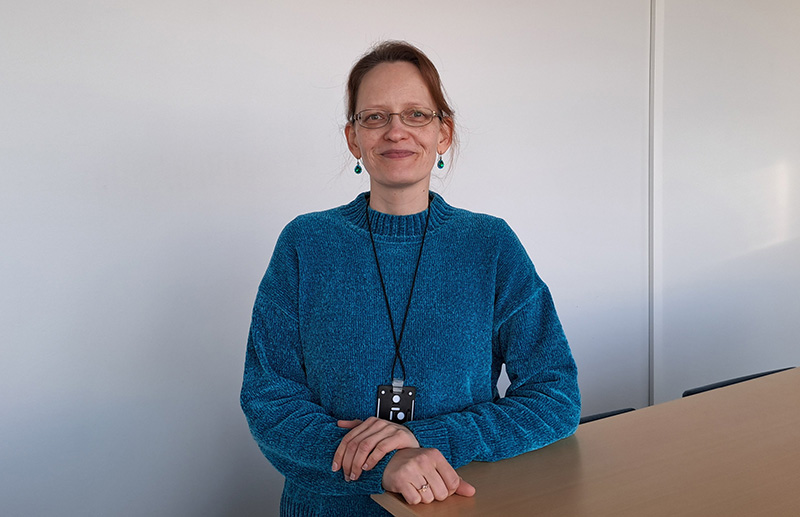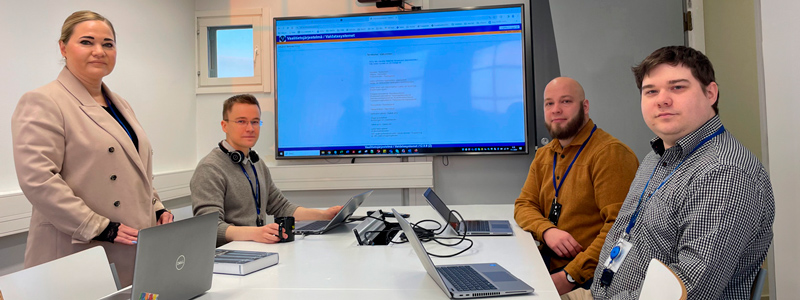Working at the LRC: what is it like to work with us?
On this page, you’ll find stories from our employees about what it’s like to work at the LRC. You can read more about our staff’s everyday experiences on social media using the hashtag #töissäORKssa.
Heidi Jalokinos, IT Planner

- As an IT Planner at the Legal Register Centre (LRC)
- Graduated with a Bachelor of Business Administration from Vaasa University of Applied Sciences.
- Approximately 20 years of experience in the IT field, with over 5 years in the public sector.
Briefly describe your job
I work as the service manager for the criminal record system within LRC’s internal systems IT team. I’m responsible for the development and maintenance of the system. The criminal record system primarily stores information about individuals sentenced to imprisonment or community fines. This data is used, for example, in determining criminal sanctions. It can also be disclosed as a criminal record extract to authorities to assess a person’s reliability and suitability.
My responsibility is to ensure the system remains operational. I respond to and investigate disruptions and handle incident reports, which I forward to application and service providers. System development includes planning system versions, testing and approving changes, and deploying new versions into production.
How did you end up in your profession?
I graduated as a Bachelor of Business Administration in 2003 and ended up in the IT field through a few twists and turns. I worked in the private sector for a long time before starting my career in the public sector. Initially, I worked as a registry secretary with the criminal record system, and later transitioned to an IT Planner role for the same system.
Working as a registry secretary provided an excellent foundation for my current role. It was extremely valuable to first experience the system as an end user before moving into development work.
I’ve really enjoyed working at LRC and feel that I’ve found my place in working life.
What is your typical workday like?
During the workday, I handle most tasks via email and instant messaging and navigate through several different systems. My work involves daily discussions with clients and application providers, particularly regarding disruptions and system development.
My workweek includes several meetings where we go over current system-related topics or new legislative changes that require system updates.
I also participate in internal training sessions. It’s great that LRC encourages employees to pursue training opportunities that interest them, when work allows.
What is your work environment and schedule like?
My working hours are based on standard office hours, from 8:00 to 16:15, but we have flexible working hours. I prefer to work during regular hours, but I really appreciate the ability to adjust my schedule when needed. This flexibility helps balance work and family life.
Since the system must be operational during office hours, any changes are implemented in the evenings after hours. I’m always involved in these to ensure everything runs smoothly.
At LRC, we work flexibly in a hybrid model. I go to our office in central Hämeenlinna at least once a week.
What skills are required in your profession?
I work in a coordinating role, which means I need to be aware of many different aspects, even if I’m not directly handling them myself. In this role, I get to use my skills in vendor and incident management, task coordination, and problem-solving.
Daily prioritization is essential. Good stress tolerance is also needed, as unexpected disruptions often occur and require quick responses.
Curiosity and a desire to solve problems are also important. Although my work requires a high degree of initiative, I can always rely on support from my colleagues.
What’s the best part of your job?
The freedom to make decisions and take responsibility for my work and its prioritization. Throughout the day, I make many small decisions that help move the system forward. At the same time, I continuously refine and improve my working methods.
Another plus is the variety in the work—there’s always something new happening alongside routine tasks. We also have a great team where we can brainstorm together. My colleagues are amazing!
What challenges are involved in your profession?
One challenge is learning to tolerate incompleteness. Even when one task is finished, there are always several other projects ongoing. You also need to accept imperfection and move away from the mindset that you must know and do everything yourself.
Delegation is a key part of working in a multi-vendor environment. As a service manager, I monitor the work of vendors and ensure it’s done according to the client’s expectations.
What would you say to someone considering a career as an IT Planner?
This profession suits someone who enjoys challenges and diverse tasks. An IT Planner should be curious, willing to investigate things, and open to viewing changing situations from different perspectives. Collaboration with different people is also essential.
My motto is: “Don’t assume—verify.”
How do you see the future of your profession?
People sometimes say that robots will take over jobs in IT. That won’t happen here—expertise and subject knowledge are becoming increasingly important. For example, improving services comprehensively requires complex decision-making based on prior experience.
Of course, robots and automation already help with certain routine tasks.
Work on the Election Information System is societally important and carefully planned cooperation
The Legal Register Centre (LRC) starts preparing for the elections in good time. We work on the Election Information System all year, but every election day is still special.
LRC’s Elections and Other Democracy Services unit does important work on the Election Information System used in all general elections in Finland. The unit has been preparing for the 2024 presidential elections and European elections since spring 2023.
The head of the unit, Systems Manager Anniina Tjurin, says that the Election Information System is owned by the Ministry of Justice and LRC is responsible for its development and technical maintenance together with the Government ICT Centre Valtori and certain subcontractors.
”We work on the elections year round at LRC. We started preparing for the presidential elections and European elections at the same time, in May 2023. The Election Information System is used for everything from registering candidates and registering and calculating votes to result services. ”
According to Tjurin, the period between elections is used for developing the Election Information System.
”I have worked in various duties related to the Election Information System since 2007 and have now held the post of Systems Manager for a couple of years. But you never get tired of working with elections, as every election is unique and there is always room for improvement. It is fantastic to be able to influence such a societally important event through one’s own work”, Tjurin says.
A comprehensive overhaul of the Election Information System is also underway, aiming for the deployment of the new Election Information System for the 2027 parliamentary elections.

Preparing for elections is diverse work
Citizens see and experience the elections through the candidates’ campaigning, campaign tents and, of course, by voting in advance or on the actual election day.
The LRC elections unit starts preparing for each election about eight months before the election day.
”We test the system and train and instruct its users. We also prepare for different scenarios together with the Ministry of Justice and other partners. So our work is really diverse”, says Tjurin.
University trainees are always hired for each election. Their work includes answering citizens’ questions on the election hotline and running the postal voting support service.
“Very few want to leave”
The LRC elections unit employs roughly 10 people with diverse qualifications and educational backgrounds. The unit’s employees include masters of political science and technical experts.
”We have a fantastic team spirit. Everyone has their own strengths that we can tap into. When a person gets into the elections team, they generally don’t want to leave”, says manager Tjurin with a smile.
IT designer Mikko Lampo also enjoys working in the elections team, and the 2024 presidential elections are the sixth elections of his career. Lampo is responsible for the Election Information System help desk and the development of the system together with technology suppliers in between elections.
”We shouldn’t forget that the actual work is done in the municipalities and electoral districts. We only make sure that the system works as it should”, Lampo says.
According to Lampo, the best part about working on the elections is the feeling that you are doing something important. He is also pleased that he has been able to develop his professional competence between elections and has been given more responsibilities as a result.
This article was originally published as a news article on the Legal Register Centre’s website.
IT designer took 9 years of leave to see the world
Work experience with the Legal Register Centre jump-started Niko Vuorenmaa’s path to heading an ICT unit in a UN project in Jordan.

IT designer Niko Vuorenmaa from the Legal Register Centre (LRC) is only 43 but has already had two careers: a Finnish career in the administrative branch of the Ministry of Justice and an international one in the UN and EU.
Vuorenmaa joined the administrative branch of the Ministry of Justice in 2009 for the practical training included in his IT engineer studies. His practical training at the LRC’s predecessor, the ICT Service Centre for the Judicial Administration (OTTK), went well and he was offered permanent employment. Vuorenmaa started his LRC career as a project coordinator for the ROTI customer information system project.
After three years at OTTK, Vuorenmaa applied for CMC Tast training to study civilian crisis management from the perspective of technical assistance and support, and was admitted to the programme. CMC is Finland’s expert organisation in civilian crisis management.
The Tast graduates were assigned to an ad hoc base pool, whose members could be offered tasks anywhere in the world at short notice. Vuorenmaa was soon invited to apply for a specialist position in the UN Crisis Management Centre in Jordan in the Middle East.
“The UN sent a request to the EU for candidates for the Stand By Partner project from every Member State. Hundreds of people were interviewed, and I was selected from Finland”, Vuorenmaa says.
Experience at the LRC prepared him for building communications infrastructure
Vuorenmaa’s first job title in Jordan in 2013 was Network and Infrastructure Expert. His job was to build communications technology infrastructure and a field office in the city of Mafraq in the Syrian refugee zone, and he was successful. After six months, he was offered other projects.
In Jordan, Vuorenmaa advanced to IT service manager and finally head of the ICT unit. As one of his many projects, Vuorenmaa led his unit in mapping, designing and building a sustainable, stable and unified VHF radio infrastructure that replaced the one provided by the Jordanian army.
“That was really interesting. The things I learned at LRC were useful to me abroad. Working on communications technology, information systems and people in a diverse environment kind of prepared me for working abroad.”
Field conditions, a different culture, the climate and the threat of conflict are very different from working at the LRC’s Hämeenlinna office, but IT technology the same everywhere.
“Laptops and mobile phones are the same no matter where you go, but the security settings, firewalls and antivirus solutions are different. I think that ignorance is the greatest challenge in working abroad. You adapt to new work and different environments quickly as long as you set out with an open mind without a single assumption. You will learn everything as you go.”
The EU offered border work
After four years in Jordan, Vuorenmaa left for the European Union (EU) Border Assistance Mission (EUBAM-RAFAH) in the Gaza Strip between Egypt and Palestine. His duties included instructing Palestinian officials on border traffic control and the use of the systems.
He spent six months in Gaza, and after a summer in Finland, Vuorenmaa joined the EU Border Assistance Mission (EUBAM-LIBYA) in Tripoli, Libya, for another five years.
“The things that most struck me in Libya were the war-torn landscape, conflicts between the various militias, and the locals. In the middle of all the chaos, however, the people were always friendly and positive”, Vuorenmaa says.
The IT designer ultimately agreed on a nine-year leave of absence with the LRC and gained a wealth of experiences abroad that he will never forget.
“I recommend going abroad to everyone interested in working with people from different cultures. It is immensely rewarding. A dynamic multi-operator environment brings its own challenges, and it can take some time to find the information you need, but these challenges are not unheard of in my own administrative branch in Finland either”, says Vuorenmaa.
Developing tools for domestic judicial administration
Vuorenmaa is now fulfilling our organisation’s and personnel’s objective of supporting functional and secure networks and systems in the field of domestic judicial administration. Since 2023, the Legal Register Centre’s IT designer has shared responsibility with Valtori for workstation services and applications in the judicial administration, ensuring that the equipment is always up to date, reliable and efficient.
“Most recently, I made a policy proposal for extending the lease periods for laptops and mobile devices while lowering the equipment costs of the judicial administration”, says Vuorenmaa as an example of his work.
He has high praise for the IT sector and the LRC.
“I recommend IT because IT experts will be needed forever. You can always improve yourself and study more of the field. Personally, I want to keep pace with the state of the art. If you like challenges, a dynamic environment and development opportunities, the IT sector is a good choice.”
Vuorenmaa recommends the Legal Register Centre for its flexible working hours and supervisor who trusts in the performance and competence of their personnel. You always get support and never have to be alone, unless you want to.
“I did take a bit of time off from the LRC, spending nine years abroad. But I do like it here, I came back after all”, Niko Vuorenmaa says with a smile.